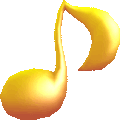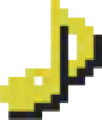Note
- This article is about collectible items in the Super Mario series. For other uses, see Note (disambiguation).
- "Musical notes" redirects here. For the characters from Mario Party DS, see Musical Note.
| Note | |
|---|---|
 Artwork from Super Mario Odyssey | |
| First appearance | Super Mario Galaxy (2007) |
| Latest appearance | Mario & Luigi: Brothership (2024) |
| Effect | Rewards the player with an item when all notes are collected |
Notes (also called music notes,[1] musical notes,[2] or song notes[3]) are colorful items in the Super Mario franchise that debuted in Super Mario Galaxy. Making contact with an environmental trigger causes a string of notes to appear in the immediate area for a limited period of time. Collecting every one rewards the player character with an item. The player character collects a note just by touching it, which is accompanied by the sound of a single musical note. Each note in the string plays a musical note at a different frequency from the others. In most games, collecting each note in succession sometimes creates a melody.
Notes are generally shaped like eighth notes, though large notes[4]—the environmental triggers in Super Mario Odyssey—are shaped like treble clefs.
History
Super Mario series
Super Mario Galaxy
In Super Mario Galaxy, notes usually appear when Mario (or Luigi) touches a ? Coin, although the ones in the Gold Leaf Galaxy appear if the player rings a bell with the Star Pointer. Afterwards, they line up, and Mario needs to grab all of them. The background music also mutes when the notes are activated. Each note makes a different sound and together forms a short jingle or tune, typically from another game in the Super Mario series. If the player gets every note, Mario will get an item, such as a 1-Up Mushroom. However, if the player fails to collect all the notes within the time limit, the remaining notes will disappear. The notes are also used in a few galaxies where they need to be collected to get a Power Star, such as the Hurry-Scurry Galaxy, the Gold Leaf Galaxy, and the Sea Slide Galaxy.
Super Mario Galaxy 2
In Super Mario Galaxy 2, notes appear in the Puzzle Plank Galaxy, the Boo Moon Galaxy, and the Throwback Galaxy. They retain their function from the first game, but their environmental triggers are more varied. In the Puzzle Plank Galaxy, Ground-Pound Switches cause notes to appear. In the Throwback Galaxy, they are released from a smashed crate. A ? Coin appears as a trigger only in the Boo Moon Galaxy.
Super Mario 3D Land
Notes appear in Super Mario 3D Land as well with a similar purpose, activated by a P Switch or when a bush is rustled. If all of the notes are collected, Mario can earn a power-up if he is in either Small form or Super form. Otherwise, he earns a 1-Up Mushroom.
Super Mario Odyssey
In Super Mario Odyssey, large notes (recognized as "treble clefs" in the Prima Games guidebook)[5] appear in every kingdom except for the Dark Side and Darker Side of the moon. Touching one causes a string of small notes[4] to appear. Collecting all of them awards Mario a Power Moon. Notes appear in 2D areas, the first instance where they have been included in an area on a 2D plane. Like platforms, enemies, other items, and Mario himself, notes appear as 8-bit sprites in these areas. Notes are a prominent component of the Playing in VR mode added in version 1.3.0 on April 25, 2019, in which collecting all of the notes in an area reveals an instrument that must be returned to a corresponding musician.
The name of each Power Moon that appears after the player collects notes is prefixed with the pun "Taking Notes."
Minecraft
Notes replace Music Discs in the Super Mario Mash-up in Minecraft.
Super Mario Party
Notes appear in the River Survival mode of Super Mario Party. Collecting every note in a single route causes a Minigame Balloon to appear. This is the notes' first appearance in the Super Mario franchise outside a mainline title.
Mario & Luigi: Brothership
In Mario & Luigi: Brothership, notes appear when the P Switch in Rumbla Island is activated. Collecting all of them reveals a present containing Dirt-Cheap Wear.
Melodies played by notes
- The chromatic scale (Super Mario Galaxy games and Super Mario Odyssey only)
- Underground Theme from Super Mario Bros. (Super Mario Galaxy games only)
- Underwater Theme from Super Mario Bros. (Super Mario Galaxy games and Super Mario 3D Land only)
- Super Mario World bonus area theme (Super Mario Galaxy games and Super Mario 3D Land only)
- First few notes of the Athletic Theme from Super Mario Bros. 3 (Super Mario 3D Land only)
Gallery
Models from Super Mario Galaxy
Screenshot from Super Mario Galaxy 2
Screenshot from Super Mario 3D Land
Artwork from Super Mario Odyssey
Screenshot from Super Mario Party
Names in other languages
| Language | Name | Meaning | Notes |
|---|---|---|---|
| Japanese | 音符[6] Onpu |
Note | |
| Chinese | 音符[?] Yīnfú |
Note | |
| Dutch | Note[?] | - | |
| French | note[?] | note | |
| German | Note[?] | - | |
| Italian | Nota[?] | Note | |
| Russian | до-ре-ми[?] do-re-mi |
do-re-mi | |
| Spanish | nota[?] | note |
References
- ^ "Collect music notes to recover the instruments, and then return them to their rightful owners." – Bonus: Travel Hints (25 Apr, 2019). Super Mario Odyssey by Nintendo EPD (Ver. 1.3.0). Nintendo of America.
- ^ Esmarch, Nick von (2011). Super Mario 3D Land: PRIMA Official Game Guide. Roseville: Prima Games. Page 34, 52.
- ^ Walsh, Doug, and Epstein, Joe (2017). Super Mario Odyssey: PRIMA Official Game Guide (Collector's Edition). Roseville: Prima Games. Page 186, 193, 210, 245, 273.
- ^ a b "Touching one of these large notes causes a string of small notes to appear for a limited time." – Sakai, Kazuya, kikai, Rachel Roberts, and Jenny Blenk, editors (2019). "Sand Kingdom". The Art of Super Mario Odyssey (First English Edition). Milwaukie: Dark Horse. Page 113.
- ^ Walsh, Doug, and Epstein, Joe (2017). Super Mario Odyssey: PRIMA Official Game Guide. Roseville: Prima Games. Page 38, 50, 84, 108, 116, 128, 143.
- ^ Sakai, Kazuya, and kikai, editors (2018). 『スーバーマリオ オデッセイ 公式設定資料集』. Tokyo: ambit (Japanese). ISBN 978-4-19-864696-7. Page 113.










